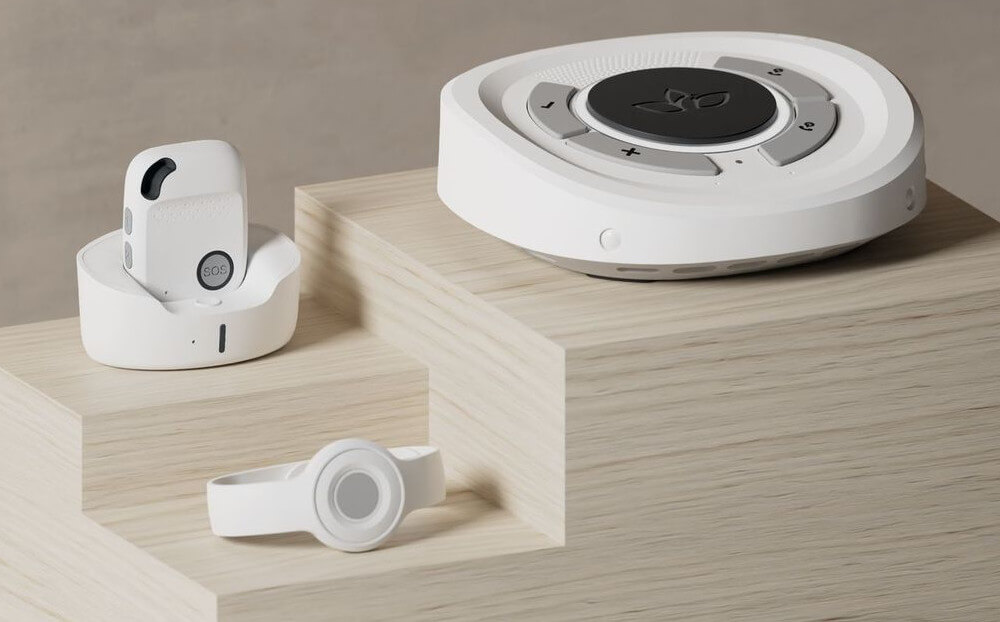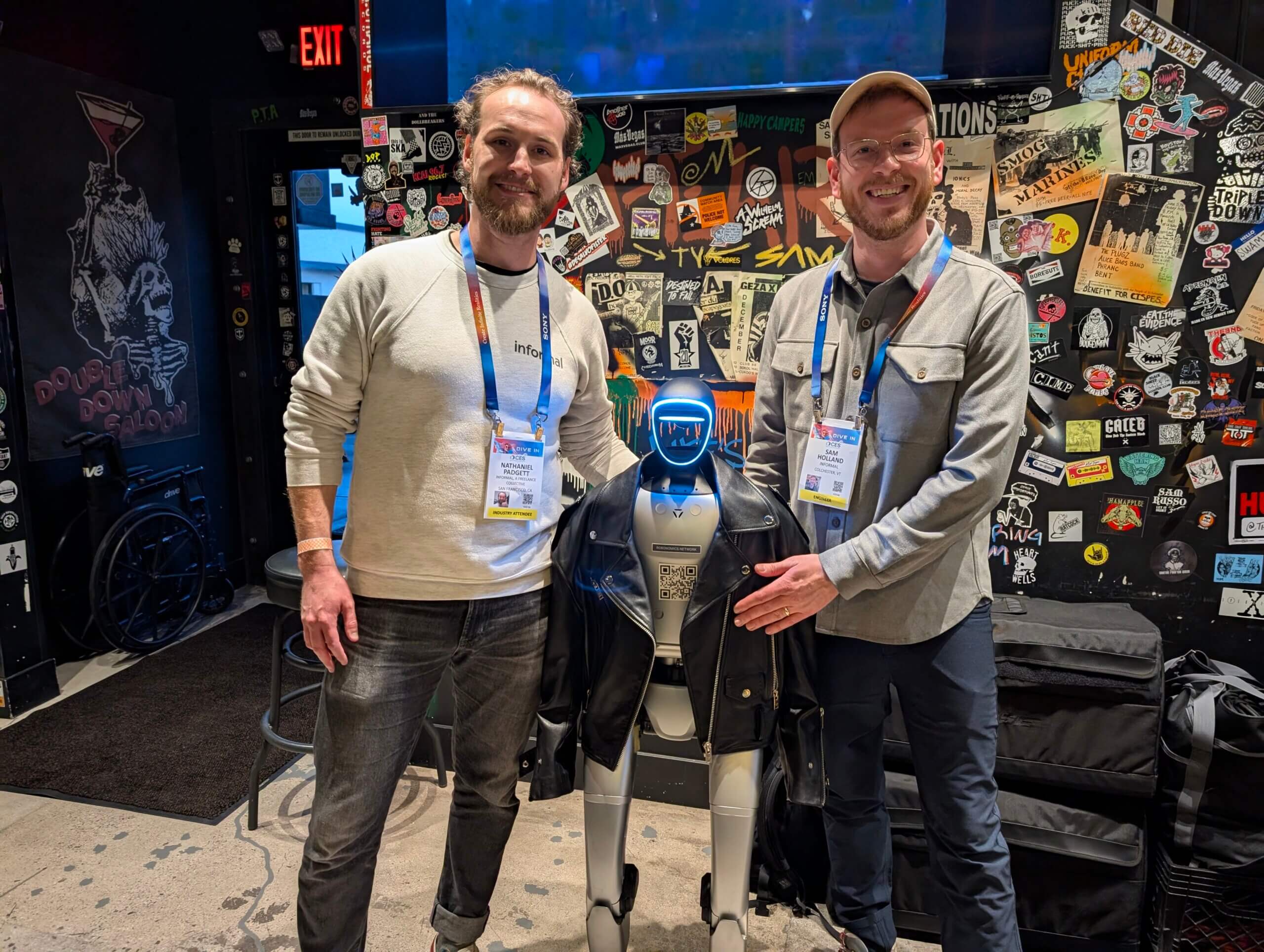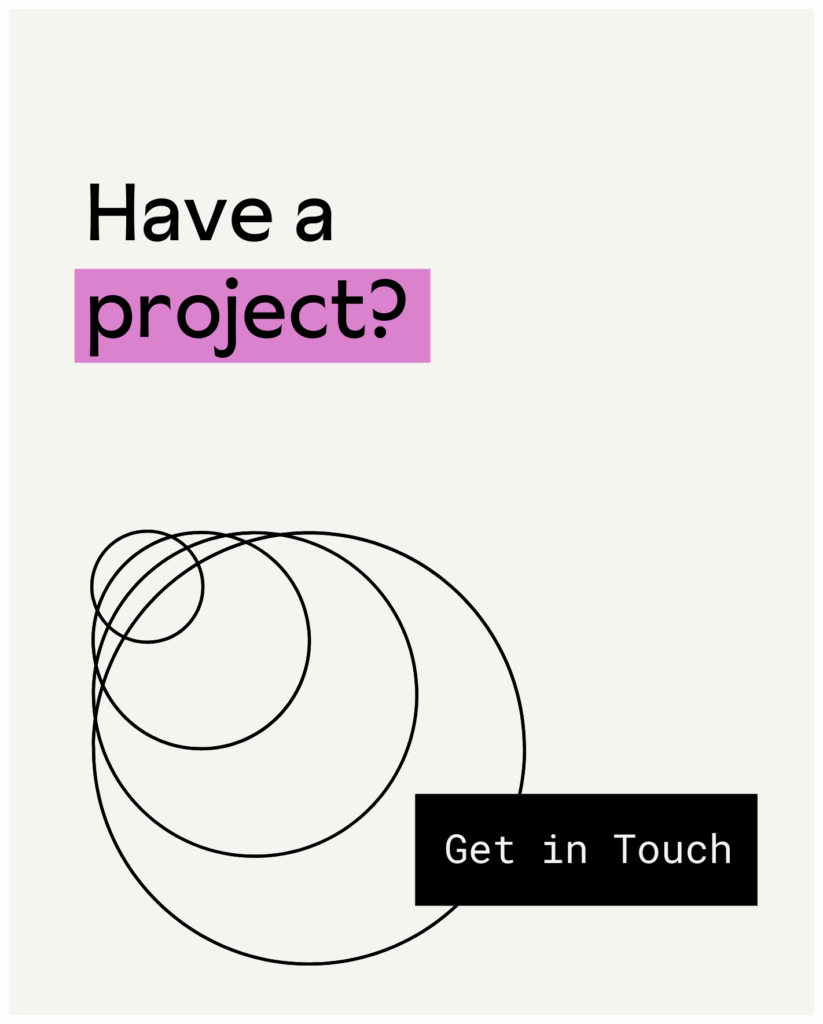How one coffee sparked a hardware movement

By now, if you’ve been following our work, you know that informal is an ever-growing freelance collective for the most talented independent professionals in hardware and hardtech. We currently have over 300 professionals in our community, with expert-level skills in everything from mechanical engineering to packaging design. And at the root of our collective is the passion and vision of our cofounders Sam Holland and Nate Pagett. Between Sam’s expertise in product engineering and manufacturing and Nate’s chops in the realm of community-building, marketing, and strategy, they’re a force (for good) to be reckoned with.
As Paul Graham, cofounder of software startup accelerator Y Combinator, famously stated, “Cofounders are for a startup what location is for real estate. You can change anything about a house except where it is. In a startup, you can change your idea easily, but changing your cofounders is hard. And the success of a startup is almost always a function of its founders.” We’re certainly glad Sam and Nate are at the helm of informal.
The story of how Sam and Nate met is a fun one, and their perspectives on the importance of freelance professionals and the future of hardware are definitely worth a read. Their enthusiasm and joy for what they (and informal) do best is contagious. Pull up a chair and join us in our conversation to learn more.
You’ve said that informal began almost instantly after the two of you met. How did that encounter turn into a decision to build a company together?
Sam Holland: I was getting a bit burned out at work and had just fallen in love with using Onshape as a CAD tool. I reached out to Craftsman Ave, a local makerspace, to see if they’d be interested in having me teach a class about it. Nate answered the email, and we talked for about an hour — mostly about freelancing and how fun it is, not the class at all. We met up later that day for coffee, and informal was born!
Nate Pagett: Our cofounder story is pretty wild if you think about it. I was consulting and running hardware community spaces like Craftsman Ave and TechShop, constantly recruiting instructors to teach fabrication and design classes. When Sam reached out about teaching Onshape — which I’d just started using as an alternative to Fusion360 — I was eager to chat.
But our conversation quickly veered from Onshape to freelancing — how independent experts could massively accelerate early hardware teams while keeping costs low. I’d seen that firsthand through NY Hardware Meetup and my own work in early-stage hardware. A few hours later, over coffee, we realized we’d both been thinking about starting a collective of top freelancers for any kind of hardware project. Less than 24 hours after meeting, we decided to make it real — and that became informal.
Now informal is built around a network of independent experts — from engineers to designers, marketers, and C-suite consultants. Why did you choose to center the business on this freelancer-first model?
Sam: Other platforms for finding freelancers are oversaturated, which drives a race to the bottom on quality and price. We believe experts should be valued and compensated appropriately. Most freelancers and consultants want to focus on their craft, but they’re weighed down by everything else — business development, contracts, invoicing, project management. If we take that burden off their plate, they have more space to do great work and actually enjoy it.
Nate: Early on, people assumed our network was full of early-career freelancers, like you find on big marketplaces that prioritize volume over quality. In reality, we’re extremely selective — informal is built around seasoned experts who are already in demand. They want to work on projects they care about, not just any gig, so we focus on connecting them with meaningful opportunities.
We’re not just a conduit for jobs; we’re building a system that supports fulfilling, sustainable, independent work. For clients, that means happier, more engaged contributors who deliver faster and often more affordably — not because they have to, but because they want to.
Growing a hardware-focused services business presents unique operational challenges. How did you define informal’s core service model early on, and how has that shifted as your clients and projects got larger or more complex?
Sam: Early on, we focused on building the software foundation before “pouring gasoline on the fire” with more clients or freelancers. We created systems that make us true hardware matchmakers — finding the right expert for any project, rather than assigning whoever’s on the bench. As projects grew in scope and complexity, we layered in better tools for defining assumptions and scopes. I’ve also always believed in taking small bites — tackling manageable project phases instead of overcommitting too early.
Nate: From day one, we knew we didn’t want to be another agency or a faceless marketplace. Sam and I came from opposite sides of hardware — engineering and brand — and we wanted to merge those perspectives into something new. So we built a hybrid: the structure and reliability of an agency, with the flexibility and network effects of a platform. That balance has stayed constant even as our clients and projects have scaled — it’s what makes informal different.
At what point in its maturity is a startup ready to work with informal?
Sam: Any stage! My role is to understand where a company is and where it wants to go — I’m basically a trail guide for hardware. We’ve helped founders go from a sketch on a napkin to mass production, untangled teams moving on from a manufacturer, and supported growing companies with extra hands. We’re intentionally flexible, so there’s never a wrong time to reach out.
Nate: We work with everyone from solo inventors to Fortune 500s. One of the advantages of being a platform, not an agency, is access to a deep bench of hardware professionals — with different specialties, rates, and interests. That flexibility means we can support nearly any project. Our members choose which opportunities they take on, so even an early-stage founder with limited funding can find someone excited to help bring their idea to life.
You’ve built informal’s internal operations using tools like Airtable and Make. What parts of your business have you intentionally automated, and what do you believe should never be automated?
Sam: We’ve automated anything repetitive, time-consuming, or prone to error. Early on, we spent hours formatting proposals and Statements of Work by hand — now that happens in seconds. We’ve also built tools to prevent project overages, handle extensions, and give real-time snapshots of project health. Automation frees us to focus on the hard parts of our job — the creative and strategic work that can’t be scripted. We’ll always keep a human in the loop, especially when it comes to scoping projects or breaking them into smart, actionable phases. That’s still as much art as science.
Nate: Sam built our entire backend himself, which means our systems were designed from a freelancer’s perspective — practical, efficient, and human-centric. We automate what slows us down, not what defines us. Things like scoping, invoicing, and progress tracking are handled seamlessly so freelancers can focus on the work itself.
What we’ll never fully automate is matchmaking — pairing clients with the right experts. Sure, data helps, but the best matches come from understanding personalities, missions, and work styles. The goal isn’t just to fill a project; it’s to build lasting relationships that create long-term value. That takes human judgment, not just an algorithm.
Speed and iteration are gospel in software but notoriously difficult in hardware. How do you help clients move fast without breaking things when building physical products?
Sam: Part one is education. Many clients come from software, where “move fast and break things” is the norm, or from e-commerce, where you can click “buy” and get something in two days. Hardware doesn’t work like that. My role is to set realistic expectations about timelines and tradeoffs — you can move faster, but it usually costs more and increases risk. In hardware, slow and steady almost always wins. A product recall can sink a startup overnight. That said, being small and flexible lets us move faster than traditional firms while still keeping quality front and center.
Nate: Exactly — our job is to help clients understand what it really takes to build hardware and to push back on habits borrowed from the software world. The risks go far beyond recalls; in some cases, a failure could literally endanger users. That’s why patience and precision matter. We help clients identify those risks early, make deliberate tradeoffs, and avoid shortcuts that could cost them later. Moving fast in hardware is possible — but only when you know exactly where not to cut corners.
Is there a specific industry that you anticipate growing the fastest?
Sam: We’re seeing a surge of software founders moving into hardware, especially with AI-enabled devices. They’re similar to earlier IoT products but with new chipsets, sensors, and smaller form factors — often in wearables. Wellness tech paired with companion apps is another fast-growing category. Having a strong network in connected devices and wearables has been key to assembling the right teams for these projects.
Nate: Definitely AI devices and robotics — those are exploding right now, and we’re hearing from more clients exploring both. We’re also seeing steady growth in medical devices, a trend that accelerated after Covid, and in defense-related hardware due to ongoing conflicts in Ukraine and Gaza. All of these markets are still early, which means the next few years will be very active.
How do you articulate informal’s flywheel? Is the value in community, full‑stack execution, repeat business, or something else altogether?
Sam: Referrals are everything. Period. They come from our meetups, our studio spaces, past clients, partners, and our network of freelancers. A warm introduction beats shouting into the void any day. We also tell a lot of stories — successes, failures, teardowns, best practices — because educating people on how to build better hardware naturally keeps the flywheel spinning.
Nate: Our flywheel is powered by exactly that network effect. Great work leads to referrals, repeat clients, and new partnerships — all built on trust and quality. Members refer clients, clients refer clients, and even other firms refer work our way. It’s a virtuous cycle that’s fueled nearly all our growth over the past six years, driving millions in projects without traditional marketing. At the core, it all comes back to community.

Aloe Care’s Essentials Plus medical alert service.
You’ve worked with clients ranging from Neurosity and Lodge to CLEAR and Makerbot. Which client engagements surprised you most, and what did you learn from them?
Sam: I really enjoyed our work with Aloe Care on elder care products. Accessibility was central to that project, and we developed clever packaging for a hardware kit that people with limited mobility could unbox and use independently. I also loved the technical challenge of integrating flexible electronics into a head-worn brain-computer interface for Neurosity — it struck a perfect balance of design, engineering, and manufacturing.
Nate: That’s a tough one — nothing truly surprises me anymore, but we do occasionally see some wild product ideas. One memorable lesson came from working on Boppo, an age-appropriate tech product for kids. It taught us that Kickstarter isn’t an ideal platform for parenting or children’s products. The audience just isn’t there — or at least, they’re not buying as actively as they would on a direct channel like Shopify. We saw the contrast clearly through another client, Lalo, which thrives by selling directly to parents.
What’s the biggest hurdle informal has faced since launching in 2019, and how did you get through it?
Sam: Our biggest bottleneck has always been bringing in new clients and turning around proposals quickly without sacrificing quality. It’s a tough balance, especially since most of our work comes through word-of-mouth referrals. Recently, shifting trade tariffs have also made some founders hesitant to start new hardware projects, given the uncertainty around manufacturing both overseas and domestically.
Nate: Balancing sales with quality execution has definitely been our biggest challenge. With a large distributed network, there’s constant pressure to keep new projects flowing, and early on we focused more on sales than on building the systems to support that growth. The growing pains from that led directly to the robust backend Sam built, which now keeps everything running smoothly. But even with those systems, we’re still a small core team doing a lot. It’s a testament to our organization, but also a reminder that we’re always working to create more space — and time — for ourselves.
Where do you see your biggest opportunity for growth in the next 5 years?
Sam: There are tons of tools and methodologies for software development, but very few for hardware. We see a huge opportunity in building and testing new systems that make hardware collaboration and remote development easier. We’re constantly experimenting in that space — finding ways to make hardware creation, and freelancing within it, more efficient and enjoyable for everyone involved.
Nate: I completely agree. Developing better tools and processes for hardware businesses and freelancers is a major opportunity. We’re also seeing growing demand from other services firms — engineering agencies, staffing companies, even consultancies — that struggle to find qualified hardware talent. Helping those firms succeed strengthens the whole ecosystem, and that’s exactly what informal was built to do.
Looking ahead, what’s your biggest ambition for informal?
Sam: I love projects that take us from concept all the way through manufacturing, and I want to do more of them. We’re building tools and systems that make collaboration easier for larger teams, and expanding that side of the business. Any time I can point to a product in the world and say, “we helped make that,” it’s a win.
Nate: My biggest ambition is for informal to become a cornerstone of the hardware ecosystem — the connective tissue that links all its moving parts. Working with informal should be a mark of quality, the way Y Combinator signals excellence for software startups. We’re not there yet, but we’re moving fast in that direction.

How do your individual strengths complement each other—and where do you still intentionally defer or disagree?
Sam: Nate’s a puppy dog and I’m a cat. He’s so eager and excited to meet everyone and learn about their projects and how they can become part of the community. He has amazing visions of where informal can go and how it can grow. He’s relentlessly pushing the goalposts and thinking about what’s next. I call him the captain on the ship. I’m a cat in the shadows. I need to be won over and am far more risk adverse. This makes me better suited for the day-to-day operations and systems work that requires more pessimistic thinking. I’m below deck on the ship plugging holes and maintaining the engine. Both are incredibly important roles, and I think we compliment each other very well here. I’m a fan of slow and steady, and he’s a fan of fast and big. We always meet in the middle, and it’s worked so far!
Nate: Sam nailed it. He’s also our moral compass. When we’ve debated raising prices or adding membership dues, he’s the one who reminds us to protect accessibility and avoid becoming like every other platform that nickel-and-dimes people. He’s saved us from chasing short-term wins that could hurt the community long-term. I’m usually scanning for the next opportunity or way to move faster, and Sam’s the essential counterbalance — the one keeping us grounded. Every now and then, I just have to nudge him out of his comfort zone.
What’s the kind of project, moment, or message that lands in your inbox and instantly lights you up like, “Yes, this is why we built informal”?
Sam: I loooooove building teams where I know the deck is stacked with top-tier folks. We’ve worked on a few engagements recently where I literally think we have the best and most appropriate people in the world working on projects. It’s a testament to the network we’ve built over the years. I get excited whenever I hear people’s ideas and oftentimes think about them in the shower, going on walks, or instead of sleeping. I love making things too much.
Nate: We started informal because we both love building hardware and hardware companies, and helping others do the same gets us up in the morning. I love hearing about founder journeys and the new products that founders and founding teams are working on. My favorite thing is when we receive a pitch for an early concept and we imagine where we can take it, what the go-to-market will be like, etc, then we turn that into a plan and proposal. There’s nothing more fulfilling than seeing those early conversations become products on store shelves and new businesses issuing fundraising announcements.
